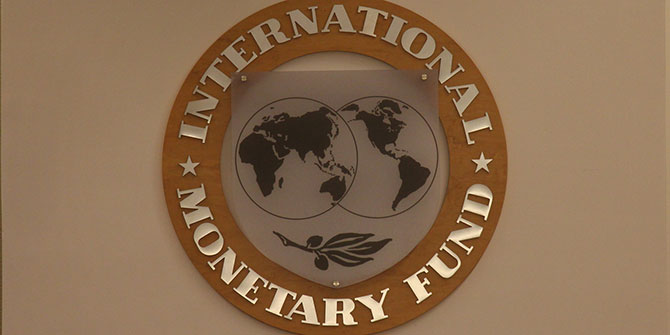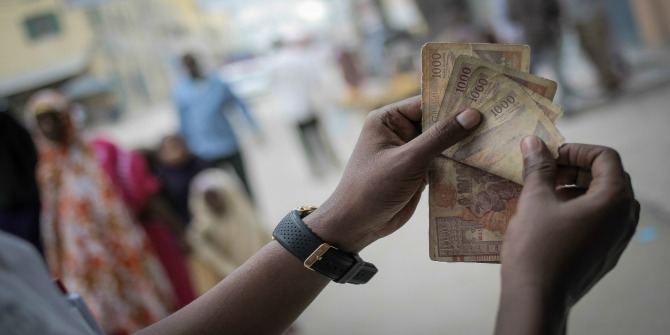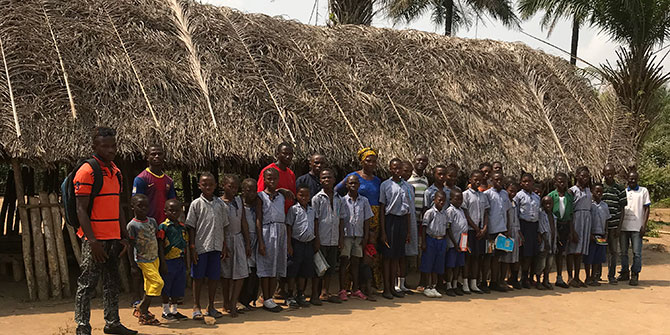While populism has become a source of recent interest among journalists and academics, the tactics of populist politics can be traced back to the colonial era. Researcher Paul Richards uncovers the ways secret societies in Sierra Leone sparked moral outrage towards public authority imposed by British rulers, overturning the power of the new chiefs and their commercial links.
Human leopards in southern Sierra Leone
A strategy of populist politics is to generate collective energy through stirring moral outrage and embroiling authorities in the outrage to a point where policies are changed. Where these strategies work there is no need to seek election or seize power. The heavy lifting has already been done. It is a tactic long known in West Africa, where it is referred to as letting opponents ‘fall by their own weight’.
The British take-over of interior Sierra Leone in the last two decades of the 19th century provides an instructive example.
The area in question was an agrarian landscape of small, compact villages and extensive dry land rice farms. Village members were organised into associations known to the British as ‘secret societies’ – Poro for men and Sande for women.
The associations and their discipline shaped social life more generally. Mutuality between initiates lasted for life. The bonds extended to farming, much of which was done cooperatively, and to marriage, where families were linked as wife takers or wife givers over many generations.
These associations were secret in the sense that members knew members, and their statuses, but outsiders did not. Leaders were held in great respect but remained in the shadows. For outsiders, the demand ‘take me to your leader’ had no straight answer, which was problematic for the British trying to enforce a protectorate in a turbulent region. A wall of silence kept them in the dark.
The secret society elders ruled not through overt displays of authority but through pulling strings unobserved. One British official was impressed by what he termed a ‘most marvelous faculty for keeping hidden what they did not wish to be known’.
Yet the colonial rulers by-passed the societal elders, whose silence and secretiveness they found daunting, preferring instead to recognise local figures of influence engaged in commerce and, for interlocutors, preferably those with some school education.
This created a new group of public authorities – chiefs of limited influence in the secret societies but well attuned to the business-oriented concerns of the British overlords. One of these new-style chiefs was an American-trained pastor who was also an investor in palm oil plantations on behalf of his church.
To prove their support, this new class of British-approved chiefs had to be chosen by an electorate made up of heads of village families. Money from commerce could buy an election, however. It looked as if the days of the older kind of chief discreetly ruling from the shadows of the society bush might be numbered.
In fact, this was far from the case. The secret society leaders knew how to mobilise the moral outrage of the village community, and how to channel this so as to undermine the newly mandated public authorities, commercial interests notwithstanding.
Discreetly, the secret society leaders spread the message that there was a new ‘medicine’ capable of granting its possessor unlimited wealth and influence, but it only worked if a child was murdered. This magical device was the property of a purported secret society, whose members carried out attacks on children while cloaked in leopard disguise in order to refresh its money-making capabilities.
The British administration, uneasy about the shadowy influence of Poro and Sande, proved susceptible to the notion of a fictitious secret society devoted to criminal pursuit of magical profit. The instigators of this discreet rebellion also knew that the village society would be morally outraged by the thought that their children were being sacrificed to mammon.
Not all observers were readily convinced. One Freetown merchant with a business in the area asserted that the idea of the magic money-making device had been dreamed up in Taiama, the regional centre of enduring resistance to British colonial advance in southern Sierra Leone, so that the more commercially oriented people of the coast would ‘kill themselves’.
Clearly, compelling evidence would be needed to stoke the boiler of moral panic. It was to be found in a circumstance stemming directly from a commercial development vigorously promoted by the British rulers and their local interlocutors – the export trade in palm oil. Land was being acquired by the British-backed chiefs (the American pastor included) for commercial plantations, pushing family rice farmers into the forested hills, where leopards half-starved by habitat loss lurked.
The death of a child torn apart by leopards was indisputable. But the killers were not wild animals. They were rogue chiefs (or so it was put about) with an insatiable appetite for gain, seeking to pass off heinous activities as the work of real leopards.
The result was uproar. Lynch mobs guided by diviners seized some of the commercially oriented chiefs and burnt them alive.
The British administration was forced to intervene. But what sort of justice could they bring to bear on people accused of being human leopards? Normal courts convened by British authorities had long since learnt to reject anything that smacked of witches or devils.
Eventually a special court was convened to deal with a large backlog of leopard murder accusations. Its three British assessors considered that talk of a secret society of sociopathic chiefs might be true. Victims had on their bodies marks of a leopard attack. In court, it was argued that these marks had been made with a special knife that simulated the damage caused by a real leopard.
One of the British judges, with his wits still about him, wondered why this special knife had never been provided as evidence. Alas, he went on leave before the trial was ended, taking his scepticism with him. The other judges were unanimous in sentencing the accused to death, despite verdicts resting largely on the evidence of informers hoping to escape a death sentence themselves.
The pastor and planter who had become a British-recognised chief was among those tried and found guilty, but his death sentence was reduced to banishment since it was considered unseemly to execute an educated man for such a ‘primitive’ crime.
The Poro secret society chiefs had rid themselves of their commercial rivals without firing a shot. Thereafter, the British continued to do the work for them, by cracking down promptly on any suspiciously wealthy person subsequently accused of leopard murder.
Governor Probyn decided that this collapse of public authority in coastal southern Sierra Leone had stemmed from on an over-aggressive policy of market integration, and blamed it on its chief architect, the British district commissioner – a former palm oil trader, Thomas Joshua Alldridge.
The community chiefs quietly watched while their enemies fell by their own weight.
From now on there was to be a greater emphasis on working with public authorities deemed authentic and traditional. The once thriving port of Bonthe subsided into economic insignificance. Even today farmer-led village cooperatives in the region perform much less well than the national average.
Those who had gamed, and changed, the colonial system of public authority were populists before the topic rose to prominence. While populism has become a hot topic for journalists and academics, alarmed by its capacity to challenge purported economic rationality, let no one claim Africa is a stranger to populist politics.
Photo by Annie Spratt on Unsplash.





